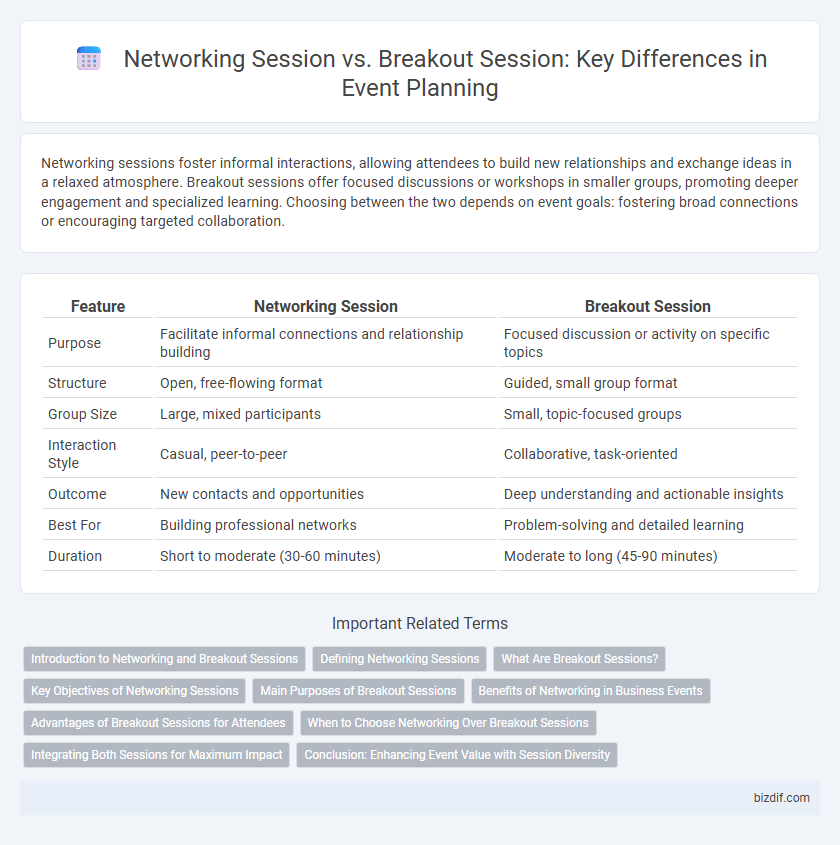Networking sessions foster informal interactions, allowing attendees to build new relationships and exchange ideas in a relaxed atmosphere. Breakout sessions offer focused discussions or workshops in smaller groups, promoting deeper engagement and specialized learning. Choosing between the two depends on event goals: fostering broad connections or encouraging targeted collaboration.
Table of Comparison
| Feature | Networking Session | Breakout Session |
|---|---|---|
| Purpose | Facilitate informal connections and relationship building | Focused discussion or activity on specific topics |
| Structure | Open, free-flowing format | Guided, small group format |
| Group Size | Large, mixed participants | Small, topic-focused groups |
| Interaction Style | Casual, peer-to-peer | Collaborative, task-oriented |
| Outcome | New contacts and opportunities | Deep understanding and actionable insights |
| Best For | Building professional networks | Problem-solving and detailed learning |
| Duration | Short to moderate (30-60 minutes) | Moderate to long (45-90 minutes) |
Introduction to Networking and Breakout Sessions
Networking sessions facilitate direct interaction among attendees, fostering connections and relationship-building through informal or structured conversations. Breakout sessions divide participants into smaller groups for focused discussions, workshops, or activities tailored to specific topics. Both formats enhance engagement by promoting collaboration, with networking sessions emphasizing social interaction and breakout sessions concentrating on targeted content.
Defining Networking Sessions
Networking sessions are structured opportunities within events where participants engage in purposeful interactions to build professional relationships and exchange industry insights. These sessions prioritize informal conversations, allowing attendees to expand their contacts and foster collaborations through face-to-face engagement. Unlike breakout sessions, which center on focused group discussions or workshops, networking sessions emphasize open-ended dialogue and connection-building dynamics.
What Are Breakout Sessions?
Breakout sessions are smaller, focused group meetings within a larger event designed to encourage in-depth discussion and interactive participation on specific topics. These sessions provide attendees with opportunities to engage more closely with speakers and peers, fostering collaboration and specialized networking. Unlike general networking sessions, breakout sessions emphasize targeted learning and problem-solving in a more intimate setting.
Key Objectives of Networking Sessions
Networking sessions prioritize building meaningful professional connections by facilitating open interactions among attendees, promoting collaboration and knowledge exchange. These sessions are designed to create an informal environment where participants can share insights, discover partnership opportunities, and expand their industry contacts. Emphasizing relationship-building, networking sessions enhance attendee engagement and foster long-term business growth.
Main Purposes of Breakout Sessions
Breakout sessions primarily focus on facilitating in-depth discussions and interactive learning among smaller groups, allowing participants to engage directly with specific topics or challenges. These sessions enhance collaboration and knowledge sharing by creating an intimate environment where attendees can ask questions, brainstorm solutions, and develop actionable insights. Unlike networking sessions that encourage broad social interaction, breakout sessions emphasize targeted skill development and focused content exploration.
Benefits of Networking in Business Events
Networking sessions in business events foster direct interactions among professionals, enhancing relationship-building and collaboration opportunities. These sessions enable attendees to exchange ideas, share industry insights, and create potential partnerships that drive business growth. Unlike breakout sessions that focus on specialized topics, networking sessions maximize real-time engagement and broaden professional connections.
Advantages of Breakout Sessions for Attendees
Breakout sessions offer attendees smaller, focused group settings that facilitate deeper engagement and personalized interactions compared to larger networking sessions. These sessions enable participants to dive into specific topics, fostering meaningful discussions and collaboration with peers who share similar interests. Enhanced opportunities for active participation and direct feedback make breakout sessions highly effective for knowledge exchange and relationship-building.
When to Choose Networking Over Breakout Sessions
Choose networking sessions when the primary goal is to foster organic interactions and relationship-building among attendees, as these sessions encourage informal dialogue and direct connections. Networking sessions are ideal for events focused on industry collaboration, job searching, or mentorship where spontaneous conversations add value. Breakout sessions are better suited for targeted learning and in-depth discussions, while networking maximizes engagement through social dynamics and personal exchanges.
Integrating Both Sessions for Maximum Impact
Integrating networking sessions with breakout sessions enhances attendee engagement by combining focused small-group discussions with dynamic relationship-building opportunities. Breakout sessions facilitate in-depth exploration of topics while networking sessions encourage organic connections that reinforce learning and collaboration. This synergy maximizes event impact, driving meaningful interactions and lasting professional relationships.
Conclusion: Enhancing Event Value with Session Diversity
Incorporating both networking sessions and breakout sessions within an event significantly enhances attendee engagement by catering to diverse interaction preferences and learning styles. Networking sessions facilitate organic relationship-building through informal conversations, while breakout sessions provide structured, topic-specific discussions that deepen knowledge exchange. Balancing these session types optimizes event value, fostering comprehensive participant connection and content absorption.
Networking session vs Breakout session Infographic

 bizdif.com
bizdif.com